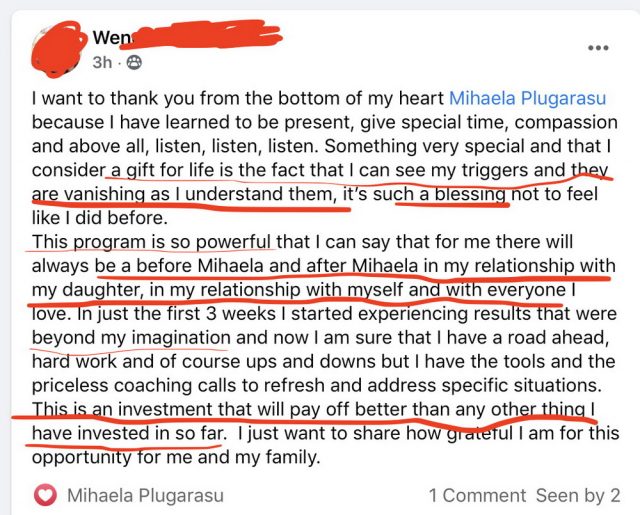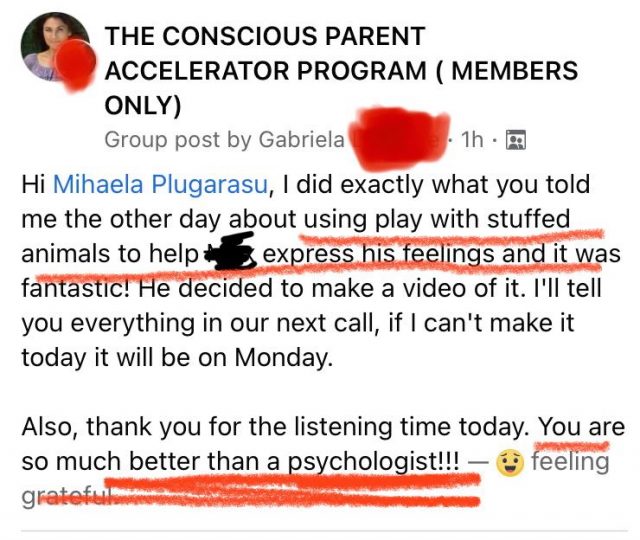Hello, dear conscious parent 💟!
Today I want to bring your attention on the unconscious behavior that most parents have: THE FIXING BEHAVIOR.
I absolutely understand and empathize with parents’ (good) intentions to help their child “fix things”, because parents want to help their children. Here are some common, everyday examples:
– fixing a situation (“That boy pushed you. I’ll talk to his mom right now.“)
– fixing a child’s emotional state (“Don’t be sad!“, “Do you want ice cream? It will make you feel better“.)
– fixing a child’s natural fear (“I am sure you’ll pass the test just fine. You’re such a smart kid!“)
– fixing a child’s natural physical pain (“It’s just a small scratch on your knee! You’ll be fine. It happens to everybody.“)
– fixing a child’s natural disappointment (“It’s not a big deal! You’ll make new friends at the new school. Everybody loves you.” )
The problem is not that we want to help our children navigate life with ease and grace. The problem is HOW we do it. When we constantly “fix things” for our children, we rob them of the opportunity to find their inner resources to solve problems, solve conflicts, be resilient, and develop emotional intelligence. When we intervene prematurely, we don’t give our children a chance to feel their feelings all the way and to regain access to their natural high-intelligence (critical thinking).
I am amazed by how many programs there are on the market on “how to raise resilient children” and “how to teach your child emotional intelligence”! Children are born resilient and emotionally intelligent. Parents however, unconsciously and unintentionally, don’t allow their children to develop these inborn abilities from a very early age, usually starting with the age of 1 (or as soon as the toddler starts walking, grabbing, opposing and throwing lots of tantrums). To understand why most parents adopt such behaviors, read my article Know Your Triggers (click here) or read my book (click here).
So, what can we do instead? LISTEN, LISTEN, LISTEN.
In their book, The Power of Showing Up, Dr. Daniel Siegel and Dr. Tyna Payne Bryson, talk about the 4 S’s young children need in order for them to wire their brains for resiliency, self-esteem, self-confidence and a positive outlook on life: being Soothed, Seen, Safe, and Secure. These 4S’s apply equally to physical and emotional safety, and they can only be achieved when the parent is able and willing to listen.
How do we listen? Quick tips:
– don’t interrupt – let your child finish their sentences, and their story; stay curious; nod your head; make eye contact; don’t ask a million questions; don’t be an investigative reporter;
– don’t be afraid of the silence in between sentences;
– don’t offer a solution, unless someone’s immediate wellbeing is in danger;
– don’t interrupt the flow and expression of emotions; allow your child to cry, feel sad, feel disappointed etc. – while you stay with them. Your loving (and quite) presence will help them heal, not your advice.
– don’t punish/shame your child for expressing healthy anger;
– offer a hug;
– tell them “I love you. I am here. You are safe now.”
***RECOMMENDED BOOK (a must read for all parents) Listen: Five Simple Tools to Meet Your Everyday Parenting Challenges, by Patty Wipfler & Tosha Schore (click here)
Speaking of my course, here's what a parent in my Conscious Parent Accelerator Program told me this week:


